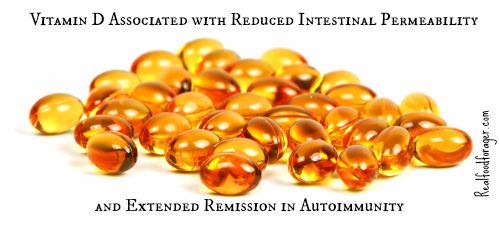
A study found that vitamin D is associated with reduced intestinal permeability and extended remission in autoimmunity, specifically Crohn’s disease.
The study was published in the United European Gastroenterology Journal and also found that the supplementation extended periods of remission. That’s significant!
Crohn’s disease, along with ulcerative colitis and Celiac fall under the monicker of Inflammatory Bowel Disease (IBD). They are characterized by inflammation in the intestines which causes cramping, bleeding and ulceration of the digestive tract.
They are also autoimmune diseases whereby the immune system may over-react to food, bacteria and other substances, causing an explosion of inflammatory chemicals that cause damage to the intestinal tissues.
Intestinal Barrier Dysfunction May Develop in Many Autoimmune Diseases
Intestinal Barrier Dysfunction is a hallmark of autoimmunity. The immune system is housed in the gastrointestinal tract. When there is inflammation present, the lining of the intestine becomes damaged and becomes leaky. This allows larger molecules of food and toxins to enter the bloodstream, become systemic and travel to extra-intestinal areas of the body. These areas include the joints, skin and other organs.
All autoimmune conditions have the common denominator of intestinal permeability. In this condition, abnormally high levels of zonulin are present. This protein regulates the permeability of the tight junctions of the intestinal barrier. Once the gut is permeable, immune responses to foods can occur, initiating a cascade of inflammatory chemicals.
Any natural substance that can reduce this cascade of inflammation is a welcome addition to a holistic regimen.
Vitamin D Encourages Healing of the Gut Lining
In this double-blind, randomized placebo-controlled study (cited above), the researchers evaluated changes in gut barrier function as well as disease markers in patients with Crohn’s disease in response to vitamin D supplementation. The study group was made up of 27 Crohn’s patients who were in remission. They were given 2000 IU/day of vitamin D or placebo for 3 months.
Researchers found that patients treated with vitamin D were more likely to maintain their intestinal barrier integrity, whereas intestinal permeability increased in the placebo group. Increased intestinal permeability has been demonstrated to predict and precede clinical relapse in Crohn’s patients.
Importantly, those patients with the highest blood levels of vitamin D showed signs of reduced inflammation, as measured by C-reactive protein and antimicrobial peptides.
When the intestine is sealed, inflammation is reduced.
This study demonstrated that a mere 2000 IU per day of vit D was sufficient to raise blood levels of 25(OH)D to ≥ 75 nmol/L in most study participants, after a 3-mo. treatment. It is this level of vitamin D that is thought to help reduce inflammation.
Vitamin D Inhibits LPS Inflammation
Another study published in the Journal of Immunology in 2012 demonstrated that vitamin D inhibits LPS-induced p38 activation and cytokine production (inflammation) in monocytes and macrophages. In my previous post about LPS, I explain that LPS is an indicator of intestinal inflammation and that it is used in research to induce inflammatory responses in mammals in order to study them.
Many conditions are induced in the laboratory by using LPS, such as Alzheimer’s, MS, IBD, diabetes, cardiovascular disease, Parkinson’s, depression, autism and many other autoimmune diseases.
Which form of Vitamin D?
Many practitioners recommend taking cod liver oil because it is a whole food and has the correct balance of vitamins A and D as well as omega 3 fatty acids (EPA and DHA). However, if you want to get your blood levels of vitamin D up to 75 nmol/L you would have to use a vitamin D supplement.
Before supplementing, be sure to get a blood level of 25-OH vitamin D as a base line. This is a measure of the level of D3 in the active form. You do not want to test or take D2 as it is the inactive form.
Of course, it is a great idea to get vitamin D from sun exposure, as long as you do it safely. It’s difficult to estimate just how much vitamin D is generated from sun exposure as this can be very individual. If you getting a lot of sun exposure then you wouldn’t need much supplementation.
Always monitor vitamin D levels with periodic blood test.
Beyond Vitamin D
While this information is very encouraging, healing and sealing a leaky gut will take more than just a supplement. Additionally, there is a concern that if you are taking just vitamin D and not vitamin A, you can develop an imbalance in these two important fat soluble vitamins.
A whole food diet is critical to healing a leaky gut.
Treatment Based in the 4R Approach
- Remove – gluten, dairy, egg, nuts and other potential allergens, as well as aspirin, NSAIDS
- Replace – support function in the digestive tract with enzymes and HCl if needed
- Reinoculate – the bowel with prebiotics and probiotics and a diet that includes resistant starch
- Repair – the gut mucosa with gelatin rich bone broths, L-glutamine and other nutrients
Diets like the SCD, GAPS, Paleo, AIP Paleo have really helped folks get back on the road to recovery.
This approach attempts to uncover the actual cause and imbalances in each individual rather than simply putting a bandaid on the symptoms. Each individual has their own set of imbalances and this needs to be corrected in a specific and individual way. Using conventional medicines that suppress the symptoms may be necessary alongside the integrative functional approach while healing is going on.
More and more there are chiropractors, naturopaths and functional medicine doctors that take this integrative approach. As always, never change your diet, medicines or supplements without involving your health care provider.
Find out more here:
Original article and pictures take realfoodforager.com site
Комментариев нет:
Отправить комментарий